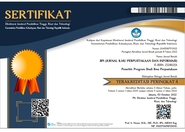Pola Perilaku Pencarian Informasi Dosen Pembelajaran Jarak Jauh Dalam Perspektif Leckie di Era New Normal
Abstract
The policy taken by the state regarding the education sector is implementing distance learning (online learning). Thus both students, students, teachers, and lecturers must adapt to these conditions so that learning continues to run as it should. In relation to this phenomenon, the purpose of this research is to identify and describe models of information-seeking behavior, especially by Distance Learning Lecturers or (PJJ) at the Faculty of Law, Sosial and Political Science (FHISIP), Universitas Terbuka in meeting their information needs. The research used descriptive qualitative design. The subjects in this study were FHISIP Lecturers at the Universitas Terbuka while the object was the information seeking behavior of FHISIP Lecturers at the Open University. Overall, the data analysis technique performed begins with data collection, data reduction, data presentation, and drawing conclusions. As for data validation, researchers used triangulation. This research found that the roles and tasks carried out by the pjj lecturers sequentially are: as educators, researchers, and community service as well as carrying out activities to support distance learning. Of all these roles, the intensity of information seeking is highest in the first role, namely as an educator because the process of fulfilling information needs is carried out every day and The characteristics of the information needs of informants as a whole are based on age, area of specialization, recent education and experience. Based on these factors, it can be concluded that senior informants have a wider range of information needs than junior informants.
Keywords
Full Text:
PDFReferences
Arikunto, S. (2013). Manajemen Penelitian. Jakarta: PT. Asdi Mahasatya.
Ati, S. (2014). Materi Pokok Dasar-Dasar Informasi 1-6. Tanggerang Selatan. Universitas Terbuka.
Bresnick, David. 1988. The Lawyer as Information Manager. Legal Studies Forum 12 : 275 - 84
Bronstein, Jenny. 2010. "Selecting and using information sources: source preferences and information pathways of Israeli library and information science students" Information Research, 15 (4) paper 447 http://InformationR.net/ir/15-4/paper447.html
Erlianti, Gustina & Fatmawati, Riya. (2019). Information-Seeking Behaviour of Students with Visual Impairments in Facing the Industrial Revolution Era 4.0. Proceesing of 3rd ICOLLITE. 242-247.
Erlianti, Gustina. (2020). Pola Perilaku Pencarian Informasi Generasi Z Berperspektif Ellisian. Jurnal Al-Maktabah. 5(1), 1-8.
Gloria J. Leckie, Karen E. Pettigrew, dan Christian Sylvain. 1996. Modeling The Information Seeking of Proffesionals: A General Model Derived from Research on Engineers, Health Care Proffesionals and A Lawyers. The Library Quarterly. Vol. 66, no. 2. Chicago : The University of Chicago.
Gralewska-Vickery, Alina. 1976. Communicationand Information Needs of Earth Science Engineers. Information Processing and Management 12: 251-82 information systems research: an application of systems modeling. Information Research, 9 4)paper 191. Dalam http://InformationR.net/
Johnstone, D., Bonner, M., dan Tate, M. 2004.Bringing human information behaviour into
Lasa Hs. (2009). Kamus Kepustakawanan Indonesia. Yogyakarta: Pustaka Book Publisher.
Moleong, L.J. (2010). Metodologi Penelitian Kualitatif. Bandung: PT. Remaja Rosdakarya.
Osheroff, Jerome A.; Forsythe, Diana E.; Buchanan, Bruce G.; Bankowitz, Richard A.; Blumenfeld, Barry H.; and Miller, Randolph A.1991.Physicians' Information Needs: An Analysis of Questions Posed during Clinical Teaching. Annals of Internal Medicine 114: 576-81
Pathitungkho, K. and Deshpande, Neela J. 2005.Information Seeking Behavior of Facility Member Or Rajabhat Universities in Bangkok, Webology, vol. 2, No.4.
Sugiyono. (2013). Metode Penelitian Kombinasi (Mixed Methods). Bandung: Alfabeta.
Yusup, P. dan Subekti. P. (2010). Teori dan Praktik Penelusuran Informasi. Jakarta: Kencana.
DOI: http://dx.doi.org/10.30829/jipi.v8i1.13715
Refbacks
- There are currently no refbacks.
Copyright (c) 2023 Habiburrahman Habiburrahman

This work is licensed under a Creative Commons Attribution-ShareAlike 4.0 International License.










_1.png)
.png)
_.png)

